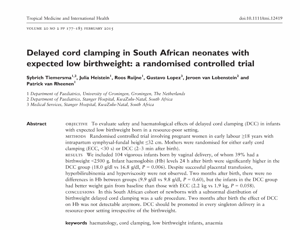Delayed cord clamping in South African neonates with expected low birthweight
In this randomised trial, Tiemersma and coauthors randomised 104 vaginally born infants to either early (< 30 s) or delayed (120-180 s) clamping. Infants were supposed to be low birth weight, why only those less than 3000 g were included.
After birth, the baby was placed on the mother's abdomen. Oxytocin was given immediatly after birth in both groups.
Interesting outcomes:
- Hemoglobin and hematocrit was higher after 24 hours: implying a successful placental transfusion
- There were no statistical difference in having a serum bilirubin over threshold: 16% (n=9) in the early clamped group and 6% (n=6) in delayed group.
- At follow up two to three months after birth, there were no differences in hemoglobin or iron statusb etween groups, but the infants in the DCC group may have had a better weight gain from baseline than those with ECC (2.2 kg vs 1.9 kg).
This study has a very good intention; to study cord clamping in low birth weight (< 2.5 kg) newborns. We need more data in this area, especially on newborns that have had intra uterine growth restriction. Importantly, the study could not show any higher occurence of hyperviscosity or hyperbilirubinemia in the DCC group, in congruence with most other recenr studies, and in opposition to what a lot of people believe.
As for the results at 2-3 months, the authors unfortunately not seem to have adjusted for the exact age at measurement. It is not possible to rule out that that the DCC group hade their follow-up some days or weeks after the ECC group, which could explain the higher weight gain. As ferritin levels decline fast during the first months of life, this might explain why the expected difference in ferritin levels beween the DCC and ECC groups was not found. The attrition rate of 30% is quite high.
Take home message:
Delayed cord clamping for 2-3 minutes was not associated with any higher occurence of hyperviscosity or hyperbilirubinemia after 24 hours, as compared to early cord clamping.
Tiemersma S, Heistein J, Ruijne R, Lopez G, van Lobenstein J, van Rheenen P. Delayed cord clamping in South African neonates with expected low birthweight: a randomised controlled trial. Trop Med Int Heal. 2015;20(2):177-183.
doi:10.1111/tmi.12419.
Kommentera gärna:
Senaste inläggen
- New Study Explores the Impact of Cord Clamping Timing on Preterm Infants
- Understanding the Dynamics of Umbilical Cord Circulation and Placental Transfusion: Debunking Commo…
- New review: Motherside care of the term neonate at birth
- Delayed clamping vs. milking in preterm infants
- Review on delivery room management of newly born infants
Senaste kommentarer
-
Israel Brown » Major break-through for delayed cord clamping: ”It is worth taking such a recommendation . However, cord milking in both preterm..”
-
Dr Robyn Thompson » Major break-through for delayed cord clamping: ”Midwives with women have not been practising early cord clamping for decades tha..”
-
Sally » Major break-through for delayed cord clamping: ”What's the number of babies needing photo therapy for term babies., talk about i..”
-
Tonia » Major break-through for delayed cord clamping: ”The picture in this article shows a placenta several minutes after delivery. The..”
-
Steve Kabamba » Major break-through for delayed cord clamping: ”What is the stand in the High burden HIV population? What is the risk of contrac..”




